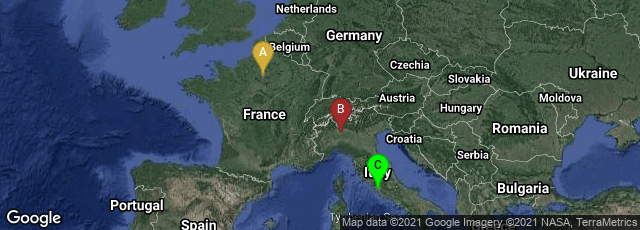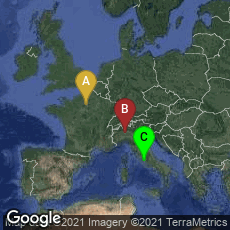

A: Paris, Île-de-France, France, B: Milano, Lombardia, Italy, C: Roma, Lazio, Italy
While a medical student in 1627 Gabriel Naudé published in Paris one of the earliest works on book-collecting and librarianship: Avis pour dresser une bibliothèque.
Naude's book, written while he served as librarian for Henri de Mesme, Président à Mortier in the Parliament of Paris and councillor to Louis XIII, contained an early mention of the goal of creating a public universal library:
"And therefore I shall ever think it extremely necessary, to collect for this purpose all sorts of books, (under such precautions, yet, as I shall establish) seeing a Library which is erected for the public benefit, ought to be universal; but which it can never be, unlesse it comprehend all the principal authors, that have written upon the great diversity of particular subjects, and chiefly upon all the arts and sciences; [. . .] For certainly there is nothing which renders a Library more recommendable, then when every man findes in it that which he is in search of . . . ."
When Naudé wrote only three "public" libraries existed in Europe: the Bodleian Library opened at Oxford in 1602, the Bibliotheca Ambrosiana founded in Milan by Cardinal Federigo in 1609, and the Bibliotheca Angelica, opened for public service in Rome, also in 1609.
Naudé's work was first translated into English by John Evelyn, and published as Instructions Concerning Erecting of a Library in 1651.
Clarke, Gabriel Naudé 1600-1653 (1970).